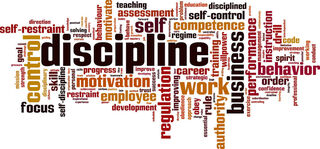Anger
How Anger Can Sabotage Our Self-Discipline
Understanding our rebellious voice supports taking action toward our goals.
Posted June 27, 2021 Reviewed by Jessica Schrader
Key points
- We may have antagonistic voices that interfere with achieving what is in our best interest.
- Anger, reflected in a tendency to be rebellious, may be a powerful force that undermines achieving our goals.
- Cultivating a chairman for the committee of voices in our head is essential if we are to be mindful of the big picture.
“No one is going to tell me what to do—including myself.”
Years ago, one of my close friends said this to me with a smirk on her face, acknowledging how this attitude interfered in her life, while at the same time seeming almost proud of it. All too often, I’ve observed the impact of this attitude expressed by clients’ reports of feeling blocked in pursuing their goals. They describe inhibition in taking action to improve their health, change a career, spend more time reading, pursue a creative endeavor, or even engage in self-care.
These blocks can be quite bewildering. It is inertia born of competing motivations—one set that encourages movement forward and another that opposes it. And while there are many reasons for such inertia, underlying anger can be a key force in undermining the self-discipline. (I address many of these blocks in my book, Unlock Your Creative Genius, 2006.)
It is mistaken to believe that who we are is consistent and unified. We are truly a multitude of perspectives, drives, and interests. We may seek to succeed in a career but also desire to spend time with family and friends. We may know a relationship requires compromise but want things to be our way. And, we may wish to be fit, but doing so requires time. As such, it makes perfect sense that several voices may show up in our mind, pushing and pulling us in different directions.
It’s often helpful to think of these voices as members of a committee. And as in any committee, they may be collaborative or compete for attention or control. Each committee member speaks on behalf of interests driven by various parts of our personality. They intend to help us. However, each may have a different perspective about how best to prioritize and achieve our goals.

Roots of rebellion
For example, we may desire to play a guitar. So one voice, from a place of “tough love” might say, "You 'should' or you 'need' to ..." in a harshly demanding or overbearing tone. The harshness may derive from intense perfectionism, either from internalizing the demands of others or from our own ingrained belief that we need to be perfect in order to gain approval, acceptance, or even love. In either case, we may resent it and experience it as a “have to” rather than as our “want,” a desire born of personal interest and emotion, reflecting what is truly meaningful to us.
When the “should” is experienced as being intensely overbearing, rebellion may become the knee-jerk response. Such rebellion is an effort to maintain a sense of autonomy. In effect, anger over feeling controlled then fuels the rebellion against following through with the “should” or “need to."
We may have voices that are overly influenced by our past, culminating in an internal voice that reflects harsh self-judgment and criticism. This is the same voice that may in fact judge us as being lazy when we fail to follow through in our dreams for change. Our rebellious voice may reflect that part of us that rebelled against parents or authority in general—as well as that part that never rebelled.
Psychologist Erick Erickson coined the term “negative identity” to describe a resolution to the difficult tasks of autonomy and individuation faced by an adolescent and young adult. A negative identity stems from identifying with roles opposing expectations from society and entails a sense of identity “consisting of negative aspects of the self” (Erikson, 1968). In effect, it might reflect the attitude, “I don’t really know who I am or wish to be, but I certainly don’t wish to be like you!” It is an identity that may support a feeling of autonomy but it neglects individuation.
This tendency can form the groundwork for a rebellious nature—even against our own desire. Being caught up in rebelling against the “should,” we may fail to develop the freedom of the “could” or even the “want to,” which are more solidly grounded within us and in our emotions.
The challenge: cultivating and evoking our chairperson
All too often, we neglect to realize that we can embolden the chairperson of our “committee.” Viewing our voices as a committee, the chairperson is that most objective part of ourselves. It has the capacity to step back, reflect on what the members are saying, and then with compassionate wisdom from our compassionate self, decide what is truly in our overall best interest.
The chairperson is the voice within us that provides guidance, nurturance, support, and compassion and may reflect all the qualities of the best leader or parent. The chairperson is driven by the freedom of “coulds." This mean it can point out the possibilities and the choices we have as well as their consequences in an effort to help us more objectively answer the question, “What is in our best interest in the big picture?”
This is the voice that reminds me to exercise when I momentarily forget how good it feels after doing so. It is the voice that moves me to embrace writing when I could do something much less challenging. It is the voice that reminds me that self-discipline actually frees us—to cultivate the person we wish to be.
Distinguishing amongst the “shoulds,” “coulds,” and “wants” is essential when confronting this dilemma. Understanding our competing motivations requires repeated mindfulness to our thoughts and feelings associated with taking action as well as to those that undermine our full presence and commitment to a task.
For example, I worked with a client who desired to lose 20 pounds. Over the next few weeks, he frequently reported the frustration of not being able to achieve his goal of eating less food. I repeatedly questioned him about his internal dialogue regarding his choices. On one occasion, he indicated that he had enjoyed a piece of pie. After some internal debate, he decided to have another slice.
We had been working together on helping him to be increasingly mindful about what his voices were telling him—what his internal committee members were advocating. He recognized the voice that said, “That sure tasted good. Let’s just have more. We’ll eventually lose weight.” With increased attention, he also recognized the harshly judgmental voice that told him in a bullying tone, “You have no control! You’re impulsive and you’ll always be fat!”
With increased practice in being mindful, he was able to identify his internal dialogue at that distinct moment. He realized, in hindsight, that the more impulsive part of him said, “Get off my back. Leave me alone. I’ll do what I want to do!”
In this scenario, the harsh voice reflects imposing “shoulds,” perhaps intending to help him through a shaming dialogue. Although intended to help him, it triggered his rebellious voice, the voice trying to assert his independence, his autonomy to choose how to behave without having to be influenced by anyone. So, both voices are attempts to help him achieve some form of personal growth—even when they may not be in his overall best interest.
I then asked my client what happened to the chairperson of his committee. Without evoking the chairperson within us, we’re subject to the whims of our committee members and their inability to recognize what is truly in our best interest.
Noted psychologist David Burns indicated that when we have too many “shoulds” in our head, we are living a “shouldy” life. So when we wish to increase our discipline toward achieving a goal, it’s really helpful to fully evoke our “chairperson.” It is this self that can remind us that if we really wish to achieve our goal, we need to first thank the members for their input. And then we can remind ourselves what we “could” do in order to meet the overarching desire.
References
Golden, B. (2006). Unlock Your Creative Genius. Buffalo. NY: Prometheus.
Erickson, E. (1968). Identity: Youth and Crisis. New York, NY: Norton.
Burns, D. (1999). Feeling Good. New York, NY: William Morrow.




